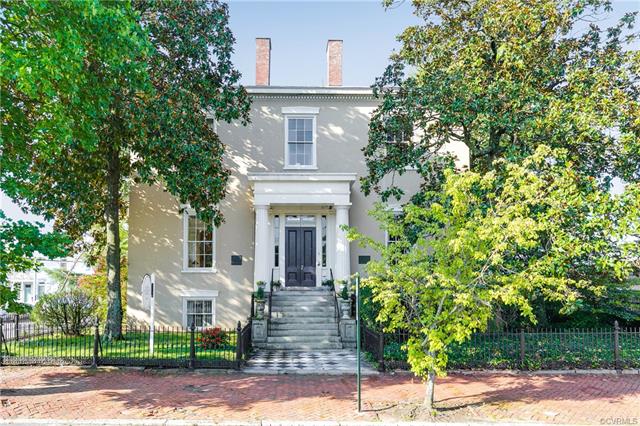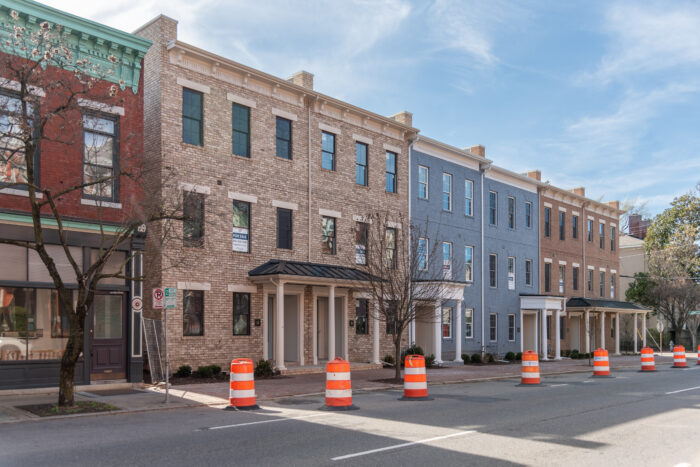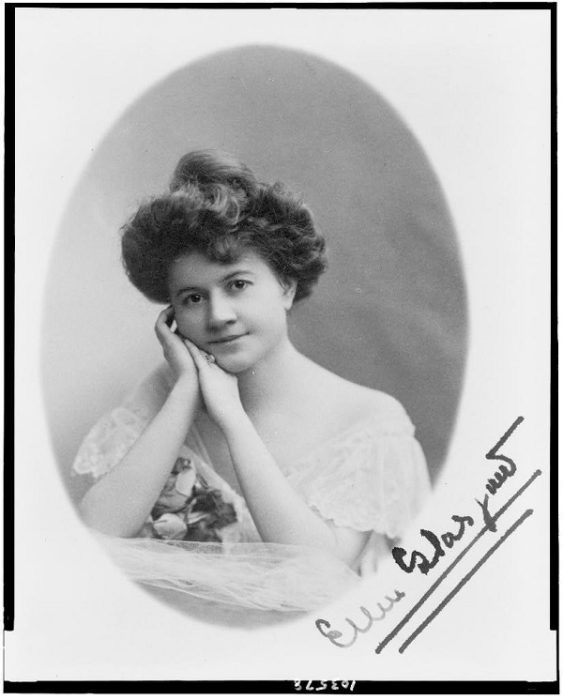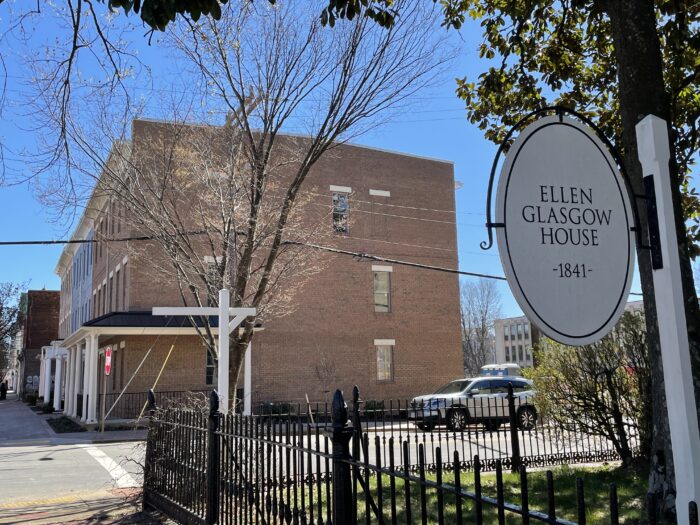Downtown, the construction of the first six of 21 upscale brick townhouses is complete at the Foushee Mews development. Situated at the southeast corner of the East Main and Foushee streets, aesthetically these architecturally contextual three-story houses, designed and built by Eagle Construction of VA, are a positive game changer for this part of Monroe Ward.
They plug a once-gaping hole in the Main Street street front that’s long been marred by too many asphalt parking lots. Most of the disfiguring spaces are owned by The Jefferson Hotel or the Commonwealth Club. Both institutions front West Franklin Street and treat West Main as a back door (especially the club). The time has come for a mixed-use parking garage.
The new Foushee Mews residences, with a two-vehicle garage set within each house, replace what had been a scrappy-looking parking lot. It faced Main and stretched along Foushee southward to East Cary. The new dwellings will not only help to repopulate downtown and generate tax revenue, but also tighten up a once-rich urban weave of various and historic buildings.
Benefiting most specifically from the Mews development is the Glasgow House, located directly across Foushee Street. It is a glorious – yet undeniably stoic – 182-year-old Greek Revival landmark. Built in 1841 by David Mann Branch, a tobacconist, the property’s subsequent list of owners reads like a cultural inventory, if not a social register. Isaac Davenport, the second owner, manufactured paper. He was followed by baker Adolph Dill (whose Greek Revival house in Jackson Ward was subsequently owned by civic leader Maggie L. Walker; an African-American women’s club; the Richmond Public Library; and most recently the Black History Museum and Cultural Center of Virginia). In 1887 the three-story, 14-room stucco and brick Glasgow House was bought by Francis Thomas Glasgow and his wife, Margaret Branch Glasgow. He was president of the Tredegar Ironworks and was regarded as a staunch Presbyterian. “He never committed a pleasure,” wrote his daughter, Ellen Glasgow. Her parents did, however, have 10 children. Ellen became a best-selling and Pulitzer Prize-winning author who lived and wrote in the house until her death in 1945.
After Ellen’s death, her brother Arthur Glasgow, who’d become impossibly wealthy as a municipal gas works developer in New York, Paris and his adopted city of London, deeded his family’s Main Street house to the Virginia Historical Society (now the Virginia Museum of History & Culture). It was soon sold to the Association for the Preservation of Virginia Antiquities (now Preservation Virginia). In the 1970s, when it housed the Richmond Center for the Arts and Humanities, esteemed local printmaker and furniture designer Harvey McWilliams had a studio in the English basement. Also in the 1970s, a leading Richmond-based architecture firm, Glave, Newman, Anderson Associates (now Glave & Holmes), occupied the updated carriage house.
Most recently, the 10,265-square-foot Glasgow House and its thickly landscaped back garden have been a private residence. It is on the market for $1.9 million.
Now that the architecturally sensitive Foushee Mews townhouses are being sold, the Glasgow House should become the centerpiece of an active residential neighborhood. So here’s a modest proposal: Can Virginia Commonwealth University buy the distinguished old house to serve as the official residence of the university’s president?
It is ideally and conveniently situated between the VCU Health and Monroe Park campuses, close enough but not too close to dorms or fraternity and sorority houses. It is large enough to be remodeled so that family living and more formal entertaining spaces could be separated. For privacy, it has a high brick wall. An available open lot to the immediate west of the property could be developed for deliveries, making the house ADA compliant and able to accommodate limited parking.
It would add immeasurably to the appeal of spirit of VCU to have its president live immediately adjacent to campus. It would revive a tradition: The president did live on campus (at 910 W. Franklin St.) until the 1970s when student unrest drove him to find shelter in the posh West End suburbs.
The dignity, appropriateness of scale and cache of the Glasgow House needs no discussion. One can imagine how great minds and spirits that often visit the campus would enjoy the experience of being entertained in rooms where the likes of James Branch Cabell was entertained (VCU’s handsome new library is named for that writer). He was a close friend of Ellen Glasgow. She also entertained Gertrude Stein and Alice B. Toklas here. And even the plot of her Pulitzer Prize-winning 1942 novel, “In This Our Life,” was set in the house.
And as for making the closing pitch within those walls to would-be donors and philanthropists, would it be gauche for the university president to mention that Arthur Glasgow, who maintained and inherited the family house, bequeathed $45 million to VCU for cancer and disease research (which it received in 2011), the largest cash gift in the university’s history to that time?
Downtown, the construction of the first six of 21 upscale brick townhouses is complete at the Foushee Mews development. Situated at the southeast corner of the East Main and Foushee streets, aesthetically these architecturally contextual three-story houses, designed and built by Eagle Construction of VA, are a positive game changer for this part of Monroe Ward.
They plug a once-gaping hole in the Main Street street front that’s long been marred by too many asphalt parking lots. Most of the disfiguring spaces are owned by The Jefferson Hotel or the Commonwealth Club. Both institutions front West Franklin Street and treat West Main as a back door (especially the club). The time has come for a mixed-use parking garage.
The new Foushee Mews residences, with a two-vehicle garage set within each house, replace what had been a scrappy-looking parking lot. It faced Main and stretched along Foushee southward to East Cary. The new dwellings will not only help to repopulate downtown and generate tax revenue, but also tighten up a once-rich urban weave of various and historic buildings.
Benefiting most specifically from the Mews development is the Glasgow House, located directly across Foushee Street. It is a glorious – yet undeniably stoic – 182-year-old Greek Revival landmark. Built in 1841 by David Mann Branch, a tobacconist, the property’s subsequent list of owners reads like a cultural inventory, if not a social register. Isaac Davenport, the second owner, manufactured paper. He was followed by baker Adolph Dill (whose Greek Revival house in Jackson Ward was subsequently owned by civic leader Maggie L. Walker; an African-American women’s club; the Richmond Public Library; and most recently the Black History Museum and Cultural Center of Virginia). In 1887 the three-story, 14-room stucco and brick Glasgow House was bought by Francis Thomas Glasgow and his wife, Margaret Branch Glasgow. He was president of the Tredegar Ironworks and was regarded as a staunch Presbyterian. “He never committed a pleasure,” wrote his daughter, Ellen Glasgow. Her parents did, however, have 10 children. Ellen became a best-selling and Pulitzer Prize-winning author who lived and wrote in the house until her death in 1945.
After Ellen’s death, her brother Arthur Glasgow, who’d become impossibly wealthy as a municipal gas works developer in New York, Paris and his adopted city of London, deeded his family’s Main Street house to the Virginia Historical Society (now the Virginia Museum of History & Culture). It was soon sold to the Association for the Preservation of Virginia Antiquities (now Preservation Virginia). In the 1970s, when it housed the Richmond Center for the Arts and Humanities, esteemed local printmaker and furniture designer Harvey McWilliams had a studio in the English basement. Also in the 1970s, a leading Richmond-based architecture firm, Glave, Newman, Anderson Associates (now Glave & Holmes), occupied the updated carriage house.
Most recently, the 10,265-square-foot Glasgow House and its thickly landscaped back garden have been a private residence. It is on the market for $1.9 million.
Now that the architecturally sensitive Foushee Mews townhouses are being sold, the Glasgow House should become the centerpiece of an active residential neighborhood. So here’s a modest proposal: Can Virginia Commonwealth University buy the distinguished old house to serve as the official residence of the university’s president?
It is ideally and conveniently situated between the VCU Health and Monroe Park campuses, close enough but not too close to dorms or fraternity and sorority houses. It is large enough to be remodeled so that family living and more formal entertaining spaces could be separated. For privacy, it has a high brick wall. An available open lot to the immediate west of the property could be developed for deliveries, making the house ADA compliant and able to accommodate limited parking.
It would add immeasurably to the appeal of spirit of VCU to have its president live immediately adjacent to campus. It would revive a tradition: The president did live on campus (at 910 W. Franklin St.) until the 1970s when student unrest drove him to find shelter in the posh West End suburbs.
The dignity, appropriateness of scale and cache of the Glasgow House needs no discussion. One can imagine how great minds and spirits that often visit the campus would enjoy the experience of being entertained in rooms where the likes of James Branch Cabell was entertained (VCU’s handsome new library is named for that writer). He was a close friend of Ellen Glasgow. She also entertained Gertrude Stein and Alice B. Toklas here. And even the plot of her Pulitzer Prize-winning 1942 novel, “In This Our Life,” was set in the house.
And as for making the closing pitch within those walls to would-be donors and philanthropists, would it be gauche for the university president to mention that Arthur Glasgow, who maintained and inherited the family house, bequeathed $45 million to VCU for cancer and disease research (which it received in 2011), the largest cash gift in the university’s history to that time?




Outstanding idea!
Great idea. MCV used to have a program where they gave financial incentives for employees to work in the city. Having the president live downtown in a grand house would only help VCU’s brand and connection to the city.
Oops, live in the city, MCV has helped employees live in the city and they could do more of this.
What’s wrong with surface parking at the Commonwealth Club or Jefferson? It is apparently sufficient and accommodating, and a darn sight better than looking at another parking garage.
I don’t believe the author meant it as criticism, but a push toward mixed-use multi story parking-structures which engender urban prosperity. With retail/business spaces on the Main Street side, the parking is contained behind and within. The hotel and Commonwealth Club’s former stark parking lots become self sustaining via leases and add countless value as corporate neighbors.
Great idea, but RAO would have to be paid a million more to put up with the NOISE. Given a choice, I would prefer not to live where I work. Especially if the ambient noise is loud – and urban cities just have that constant “hum”.
That would take another multi million dollar property off the tax rolls unless it was bought by the foundation. I’d imagine Rao would stay in his current house and this would become another underused VCU facility. No thanks.
RAO would never downgrade there…….
Brilliant, richly studded with facts about a magnificent and prestigious section this historic neighborhood. Such an excellent idea for VCU to contribute to its brand (with a gracious nod to the Glasgow legacy) with the development of the President’s house!
Absolutely. I agree with Ed Slipek. VCU’s president needs his finger on the pulse of the campus, the neighborhood, and the city. How can he fully know the vibe of VCU while sequestered away in the suburbs? And how can he extol the virtues of urban campus living without fully participating in it? Seems a bit contradictory and elitist for him to be commuting to and from VCU while young students contend with the pros and cons of living on a crowded urban campus.
I believe the $708K salary is what makes him elitist, not the fact that he does not live on campus.
Too much crime and illegal activities in that area.
RETRACTION REQUESTED: Shamefully, this will simply linger on the Internet in an abyss, since Richmond’s Main Library no longer archives Richmond BizSense periodicals. I choose to express myself here nonetheless. O’ my Southern roots are showing.. Francis Thomas Glasgow (1829-1916) married to Anne Jane Gholson (1831-1893), who stemmed from a line of U.S. Senators and Supreme Court Judges. It was one of Francis’ sons – Dr. Arthur Graham Glasgow (1865-1955) whom married Margaret Elizabeth Branch (1876-1952). A retraction of this historical note is requested. Furthermore, while we reminisce about this historical home will authors of articles such as this or the… Read more »